It is a privilege for many to be able to hike, camp or live in an area where there is highly evolved mammals such as the bear. To just as many the very thought of having a bear around evokes fear. Bears only come around people when there is food available. Bears do not consider people food. Bears that are accustomed to being around people and human establishment have not attacked people. The bears get used to the activity of the people in a certain area and therefore seem to not fear harm from the people. Although it is possible for an individual bear to become assertive when accessing peoples food in garbage or bird feeders there is no record of an all out attack from a bear behaving in this way. Many times a bears assertiveness is misread as aggression and the bear is killed. When a bear clacks it teeth, exhales heavily through its nose, slaps the ground with its paws, the bear is “asking” the person to leave or give it more space. Rarely does this kind of behavior from a bear result in a injury to a person. If you do not want to see bears up close or near your home, DO NOT encourage them with poor food disposal habits or by leaving bird feeders out after the grass turns green in the spring.– Mike McIntosh
become assertive when accessing peoples food in garbage or bird feeders there is no record of an all out attack from a bear behaving in this way. Many times a bears assertiveness is misread as aggression and the bear is killed. When a bear clacks it teeth, exhales heavily through its nose, slaps the ground with its paws, the bear is “asking” the person to leave or give it more space. Rarely does this kind of behavior from a bear result in a injury to a person. If you do not want to see bears up close or near your home, DO NOT encourage them with poor food disposal habits or by leaving bird feeders out after the grass turns green in the spring.– Mike McIntosh
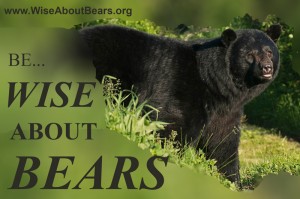 Wise About Bears offers information, a comprehensive look at the black bear, the bear’s behavior and how it is possible to coexist with these intelligent and interesting animals. When we learn about the bear, the animal as it truly is, there will rarely be a reason to intervene and interrupt the bears life.
Wise About Bears offers information, a comprehensive look at the black bear, the bear’s behavior and how it is possible to coexist with these intelligent and interesting animals. When we learn about the bear, the animal as it truly is, there will rarely be a reason to intervene and interrupt the bears life.
When we live in an area that bears inhabit, gardens, beehives and livestock enclosures can be protected and secured by a simple electric fence. If protecting livestock, remember bears are more likely to be after the livestock feed, not the actual animals themselves. I have had people call me about situations where a bear goes in and out of a fenced in area holding chickens. The bear will sit with the chickens and eat the chicken feed. In one instance the chickens were so used to the bear they would follow it around the inside of the chicken enclosure. In this case no chickens were hurt.
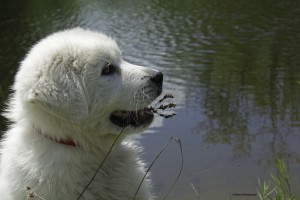
When you camp, hike or walk your dog in the woods you are far safer there than anywhere else you can be where there is many people. Bears should not be a concern, just remember to follow some simple rules. Keep your food out of your tent and out of reach to a bear. When hiking, ensure you do not surprise a bear by making noise such as singing or humming etc. If you have your dog(s) with you keep your dog(s) on a leash. Bears usually run from a dog because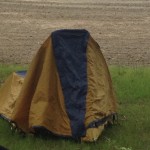 most bears have learned to associate dogs with people. However, a dog off leash may chase and harass the bear causing the bear to get angry and chase the dog. When dogs get scared they run to their owner. In at least 50% of the cases where people have been injured by a bear, the bear was reacting in self defense and there was at least one dog involved. If you hike or camp often you may want to consider purchasing some pepper spray. Pepper spray may make you feel more at ease and it is very effective.
most bears have learned to associate dogs with people. However, a dog off leash may chase and harass the bear causing the bear to get angry and chase the dog. When dogs get scared they run to their owner. In at least 50% of the cases where people have been injured by a bear, the bear was reacting in self defense and there was at least one dog involved. If you hike or camp often you may want to consider purchasing some pepper spray. Pepper spray may make you feel more at ease and it is very effective.
Bears only come around people when there is food available. Bears do not consider people food. Bears that are accustomed to being around people and human establishment do not attack people. The bears get used to the activity of the people in a certain area and therefore do not fear harm from the people. Although it is possible for an individual bear to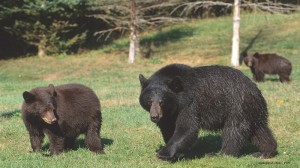 become assertive when accessing peoples food in garbage or bird feeders there is no record of an all out attack from a bear behaving in this way.
become assertive when accessing peoples food in garbage or bird feeders there is no record of an all out attack from a bear behaving in this way.
Many times a bears assertiveness is misread as aggression and the bear is killed. When a bear clacks it teeth, exhales heavily through its nose, slaps the ground with its paws, the bear is “asking” the person to leave or give it more space. Rarely does this kind of behavior from a bear result in a injury to a human.
For more information please see Human/Bear Coexistence: http://wiseaboutbears.org/about-us/human-bear-coexistence/
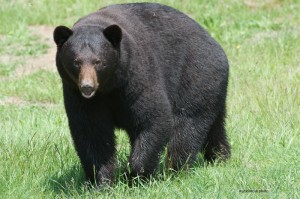 To Encourage Thought…
To Encourage Thought…
1 – We as people put boundaries around ourselves. We have boundaries where we live. What about bears? As a bear wanders about during its daily quest for food it is going to cross someones property. Why? Because we have claimed it all as ours. Is this a big deal? No!. Let the bear roam about, look for food. There is no need to be fearful of a bear. Make sure the bear has no reason to stick around. Keep bird feed and food in garbage securely locked away in the summer time. Bears and people can coexist. We can use our heads and learn that bears are “very rarely” dangerous to people. We should also remember that bears are only looking for food, not for us. Cautious respect is in order. Thank you for visiting this website and working to “Be Wise About Bears” – Mike McIntosh
2 – For some reason bears have been referred to as male = boar, female = sow. This led some people to think bears are related to pigs. Bears are not related to pigs. Modern terminology now 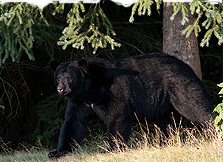 refers to bears as they correctly are, male or female.
refers to bears as they correctly are, male or female.
3 – A curious adult bear (photo to right). He is harmless, looking to find out more about the funny looking species holding the camera and is there food offered? No reason for alarm. For the bear’s sake do not allow him/her to have food sourced from you, a human. The bears life will be at risk, not yours.
4 – “In the end we will conserve only what we love. We will love only what we understand. We will understand only what we are taught.” – Baba Dioum, Senegal
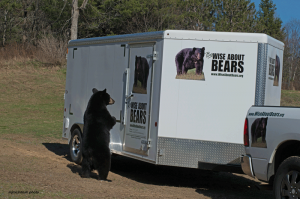 5 – “I’ve spent most of my life surrounded by incredible beauty,enjoying wonderful relationships with wild animals most of us were taught to fear. We really need to get over our fear of the wild. It’s what sustains us; not what threatens us.” – Charlie Russell~
5 – “I’ve spent most of my life surrounded by incredible beauty,enjoying wonderful relationships with wild animals most of us were taught to fear. We really need to get over our fear of the wild. It’s what sustains us; not what threatens us.” – Charlie Russell~
6 – “If you talk with the animals, they will talk with you, and you will know each other. If you don’t talk with them, you will not know them, and what you do not know, you fear. What one fears, one destroys.” ~Chief Dan George
7 – Co-existence with bears comes with responsibility. Do not approach animals in the wild, respect their habitat and above all, never feed wildlife. The wildlife will not be helped but will instead suffer.
8 – “Bears are not harmless, bears are blameless. They are being bears.” I say it is time to stop persecuting bears and other animals for being themselves.
9 – “Appreciate, view with respect, allow them to exist, coexist. They will if we will” – Mike McIntosh
10 – “Dominant themes of our folklore are fear of the unknown and man against nature, and bears have traditionally been portrayed as the villains to support those themes, unfairly demonizing them to the public.” – Dr Lynn Rogers
Answers to the many questions you have regarding bears may be answered in this video.
Text and photos – Mike McIntosh, except photo of Mike – Ella McIntosh
